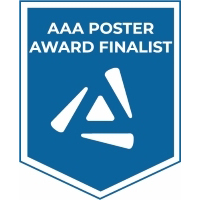Back
ANATOMY
Category: Anatomy
Session: 474 Anatomy Education
(474.15) Experiential factors affecting the empathy of students in their pre-clinical year(s) of 21 universities
Sunday, April 3, 2022
10:15 AM – 12:15 PM
Location: Exhibit/Poster Hall A-B - Pennsylvania Convention Center
Poster Board Number: C15
Introduction: AAA has separate poster presentation times for odd and even posters.
Odd poster #s – 10:15 am – 11:15 am
Even poster #s – 11:15 am – 12:15 pm
Introduction: AAA has separate poster presentation times for odd and even posters.
Odd poster #s – 10:15 am – 11:15 am
Even poster #s – 11:15 am – 12:15 pm
Joseph Vigoda (Vagelos College of Physicians and Surgeons, Columbia University Irving Medical Center, Columbia University, New York, NY, USA), Adedeji Adeniyi (Vagelos College of Physicians and Surgeons, Columbia University Irving Medical Center, Columbia University, New York, NY, USA), Lisl Tudor (Department of Physiology, Development and Neuroscience, University of Cambridge, Cambridge, UK), Cecilia Brassett (Department of Physiology, Development and Neuroscience, University of Cambridge, Cambridge, UK), Sean McWatt (Department of Anatomy and Cell Biology, McGill University, Montreal, Canada), Mandeep Sagoo (Department of Anatomy and Neurobiology, School of Centre for Education, King’s College London, London, UK), Richard Wingate (Department of Anatomy and Neurobiology, School of Centre for Education, King’s College London, London, UK), Chung-Liang Chien (Department of Anatomy and Cell Biology, College of Medicine, National Taiwan University, Taipei, Taiwan), Hannes Traxler (Center for Anatomy and Cell Biology, Medical University Vienna, Vienna, Austria), Jens Waschke (Institute of Anatomy, Vegetative Anatomy, Faculty of Medicine, Ludwig Maximilians University, Munich, Germany), Franziska Vielmuth (Institute of Anatomy, Vegetative Anatomy, Faculty of Medicine, Ludwig Maximilians University, Munich, Germany), Anna Sigmund (Institute of Anatomy, Vegetative Anatomy, Faculty of Medicine, Ludwig Maximilians University, Munich, Germany), Takeshi Sakurai (Kyoto University Graduate School of Medicine, Kyoto University, Kyoto, Japan), Yukari Yamada (Kyoto University Graduate School of Medicine, Kyoto University, Kyoto, Japan), Mina Zeroual (Department of Anatomy and Cell Biology, McGill University, Montreal, Canada), Jorgen Olsen (Department of Cellular and Molecular Medicine, University of Copenhagen, Copenhagen, Denmark), Salma El-Batti (Department of Cardiovascular Surgery, University of Paris, Paris, France), Suvi Viranta-Kovanen (Department of Anatomy, University of Helsinki, Helsinki, Finland), Kevin Keay (Discipline of Anatomy and Histology, The University of Sydney, Sydney, Australia), Shuji Kitahara (Tokyo Women’s Medical University, Tokyo, Japan), Neus Martínez-Abadías (Facultat Biologia, BEECA Department, University of Barcelona, Barcelona, Spain), Maria Esteban-Torné (Facultat Biologia, BEECA Department, University of Barcelona, Barcelona, Spain), Jill Helms (Stanford University, Stanford, CA, USA), Chiarella Sforza (Department of Biomedical Sciences for Health, University of Milan, Milan, Italy), Nicoletta Gagliano (Department of Biomedical Sciences for Health, University of Milan, Milan, Italy), Madeleine Norris (Department of Anatomy, University of California San Francisco, San Francisco, CA, USA), Derek Harmon (Department of Anatomy, University of California San Francisco, San Francisco, CA, USA), Masato Yasui (Keio University, Tokyo, Japan), Midori Ichiko (Keio University, Tokyo, Japan), Sammi Lee (The Chinese University of Hong-Kong, Hong-Kong, People’s Republic of China), Shaina Reid (Vagelos College of Physicians and Surgeons, Columbia University Irving Medical Center, Columbia University, New York, NY, USA), Ariella Lang (Vagelos College of Physicians and Surgeons, Columbia University Irving Medical Center, Columbia University, New York, NY, USA), Carol Kunzel (Vagelos College of Physicians and Surgeons, Columbia University Irving Medical Center, Columbia University, New York, NY, USA), Michael Joseph (Vagelos College of Physicians and Surgeons, Columbia University Irving Medical Center, Columbia University, New York, NY, USA), Leo Buehler (Department of Surgery, University of Fribourg, Fribourg, Switzerland), Mark Hardy (Vagelos College of Physicians and Surgeons, Columbia University Irving Medical Center, Columbia University, New York, NY, USA), Snehal Patel (Vagelos College of Physicians and Surgeons, Columbia University Irving Medical Center, Columbia University, New York, NY, USA), Paulette Bernd (Vagelos
Joseph Vigoda
Presenting Author
Vagelos College of Physicians and Surgeons, Columbia University Irving Medical Center, Columbia University, New York, NY, USA
Presenting Author(s)
Hands-on cadaveric dissection is often considered an important factor in shaping the emotional identity of medical and dental students as healthcare providers. This study explores how demographic and/or experiential factors affect the empathy of students in their pre-clinical year(s) of medical or dental school. In the Summer of 2021 and Fall of 2021, a total of 530 students from 21 universities around the world participating in the International Collaboration and Exchange (ICE) Program, completed a validated questionnaire containing the Santa Clara Brief Compassion (SCBC) Scale and the Toronto Empathy Questionnaire (TEQ). Responses to the SCBC and TEQ were tested for variance and covariance against age group, sex, clinical experience, year of health professional school, format of anatomy education, hours of study on prosections and/or hours of hands-on cadaveric dissection in their respective curricula; and whether their school provides an opportunity for reflection, information about the body donors, a memorial service, and/or addresses empathy in their curricula. Results show that having 40-90 hours of hands-on cadaveric dissection vs 0 hours yielded higher SCBC averages (p = 0.0206) and TEQ scores (p = 0.0031); and having 20-40 hours of hands-on cadaveric dissection vs 0 hours also resulted in higher TEQ scores (p = 0.0105). Comparisons of hours of study on prosections, format of anatomy education, clinical experience, and year of health professional school yielded no significant results in relation to empathy scores. Our study found that across different regions of the world, curricula emphasizing dissection are best at preparing students to become more empathetic healthcare providers. While none of the other curricular factors proved significant, this study confirms the merit of hands-on cadaveric dissection in the emotional development of medical and dental students.

